Mercedes' 'permanent scepticism' gains them 'greatest' label
- Published
- comments
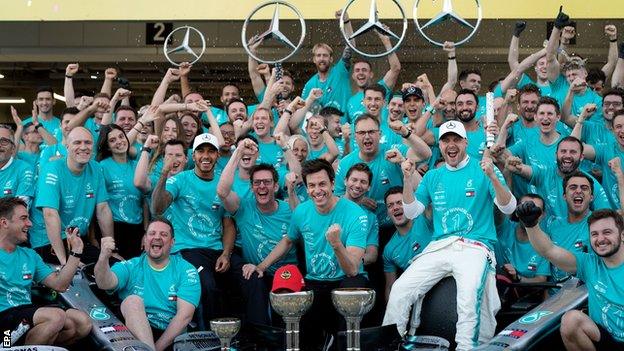
Mercedes set a new standard in Formula 1 at the Japanese Grand Prix as they secured a record-breaking sixth world championship double - and yet there was their team boss Toto Wolff after the race talking about not being able to appreciate it yet because they had been beaten by Ferrari in qualifying earlier in the day.
"We are somehow so eager to go well," Wolff said, "that this non-performance sits in our bones. But probably it is going to sink in overnight flying back to Europe."
If you needed an example of how Mercedes have established themselves as the greatest team in F1 history, that's it in a nutshell - the endless quest for better, for the next thing, what Wolff called in an interview with BBC Sport back in June "permanent scepticism, whether what we are doing is actually good enough".
To many on the outside, those remarks might almost sound ridiculous. This is a team who have dominated the era of F1 turbo-hybrid engines since 2014, won 86 of 117 races in the last five years and look in a strong position to go on next year and continue their winning streak. That's rather better than "good enough".
Knowing Wolff, and his constant quest for reinvention and the restlessness that is at the heart of his character, he was probably also thinking about the fact Mercedes have lost their engine performance edge to Ferrari this season. And that the car, while hugely successful this year, also has its flaws, particularly its high drag level, which is helping make it such a strong race car but is exaggerating Ferrari's advantage on the straights.
Hamilton, who shares Wolff's unquenchable desire for more, certainly was.
"It's not been a great year for us in terms of our engine development," Hamilton said. "It's been a really hard time for the guys. They've been working as hard as ever but it's just not been as successful in that department.
"Plus it's quite draggy but we've had great reliability and hopefully that remains the same and that's still something to be really proud of, of course.
"We have, obviously, still won the constructors' championship but we'll push to try and maybe reduce the drag a little bit but also increasing power for next year. So they're fully on to it and I have all the confidence in the world that we'll be able to make some sort of step into the next season."
Bittersweet memories of Niki Lauda
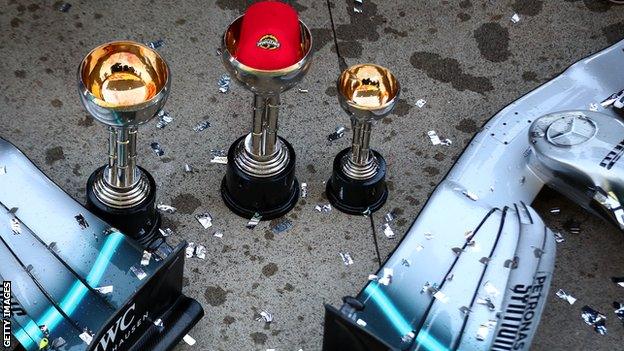
Mercedes placed a red cap in the winner's trophy in memory of Lauda
Their joy was also tempered by memories of the loss in May of Mercedes non-executive director Niki Lauda, to whom Hamilton dedicated the championship and whose famous red cap and radio headset hang in the Mercedes garage as a tribute to the late three-time champion.
"We really owe him a huge amount and this win was really for him," Hamilton said. "The whole feeling of Mercedes is probably dedicated to him. I am very proud to be a part of it. But it has been a tough year for us. Every time we walk into the garage we see his headphones and his cap."
Wolff added: "Each of the championships felt very special for different reasons. This one, again, is so special because it is not always easy to reinvent yourself at the beginning of the year and set objectives that motivate everybody and then embark on the long season.
"Niki has been missed and therefore the sixth one beating a record set by Ferrari 15 years ago is extremely special but I am not able to get it yet."
A desire to win and win

Toto Wolff said of Mercedes' six consecutive titles: "It has never been done before and that's why it feels great."
Within these remarks from the two defining figures of this Mercedes era lie the essence of how they have managed to keep their run going. How, against all the odds, they have kept complacency at bay and hunger and ambition high, despite achieving so much.
Hamilton has an apartness about him in F1 these days, an unapproachability outside his formal media duties, perhaps inevitably as a result of his fame. He uses a scooter to speed about the paddock, making it easier not to be waylaid, and very much keeps himself to himself.
But Wolff, while immensely busy, is approachable, open, relaxed, calm and warm. As an organisation, Mercedes share Hamilton's desire to keep winning, but fundamentally it is Wolff's character that pervades the team.
This year, Mercedes have won 12 of the 17 races, a statistic that speaks of domination. But while they have not had to fight anywhere near as hard as they did in 2017 and 2018, when the Ferrari was the faster car for the first two-thirds of the season, in reality it has been closer on the track than the results suggest.
Mercedes won the first eight races in a row, another new record of many, but Ferrari should have won in Bahrain, Azerbaijan and Canada, the first two with Charles Leclerc and the last with Sebastian Vettel. Had it been five-three in victories at that point, people would surely have viewed the season differently.
In mid-summer, Red Bull went on a bit of a run, Max Verstappen winning two out of three races and nearly three out of four, only losing out to an inspired Hamilton/Mercedes performance in Hungary in the last race before the summer break.
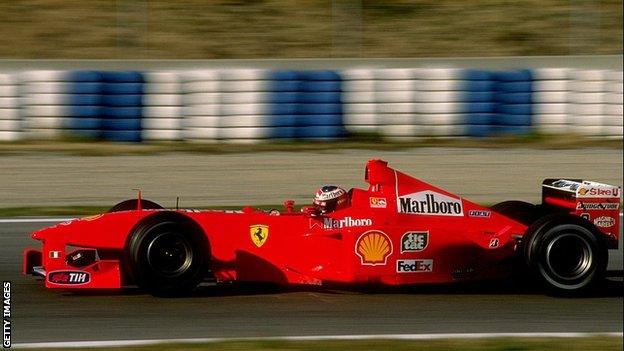
Mercedes' sixth title takes them level with Ferrari in terms of consecutive crowns - they won six constructors' titles between 1999 and 2004. Beyond that, McLaren and Red Bull had their own periods of success with four in a row between 1988 and 1991 and 2010 to 2013 respectively
And since the season resumed at the end of August, Ferrari have had the fastest car over one lap, taking five pole positions in a row, and they have won three of those five races. It could have been five consecutive victories, too.
A badly timed virtual safety car cost Leclerc victory in Russia last time out, and in Japan mistakes by both drivers at the start cost them track position. As Mercedes acknowledged, had Vettel and Leclerc run one-two from the start of the race, even with the Mercedes being a faster race car, they would have struggled to win the race.
But Ferrari keep making mistakes. In Japan on Sunday it was the drivers at fault, as in Baku where Leclerc crashed in qualifying, and Canada where Vettel went off the track under pressure from Hamilton and was given the controversial penalty that stripped him of the win.
Vettel dropped his clutch too soon, before the lights went out. He stopped again, before restarting, but still many were mystified as to why he did not get a penalty for it. Either way it lost him the race, because Valtteri Bottas was past him in a flash.
Alongside Vettel, Leclerc was distracted by his team-mate's movements, and reacted slowly to the lights. That allowed a fast-starting Max Verstappen to get alongside him and they collided at Turn Two.
Leclerc admitted his error - which earned him a five-second penalty and damaged his front wing. He said he understeered into the Red Bull in the dirty air behind Vettel but should have expected it - but did not admit to the fact that it may have been influenced by a desire not to cede ground to Verstappen, in the rapidly developing battle for supremacy between the two as the leading lights of the new generation of drivers.
How do Mercedes do it?
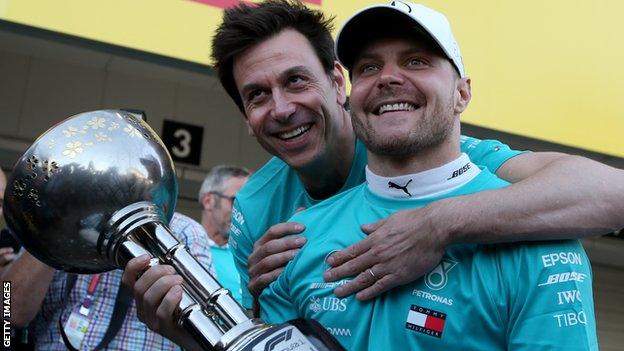
Bottas has kept his seat at Mercedes for the 2020 season
And so with four races still to go, Mercedes suddenly found themselves in a position to seal the championship double that has been expected since they dominated the first part of the season.
What makes them such a great team?
Wolff said: "It would not do it justice to come up with a 30-second answer but if I were to sum it up, it's the people, the group of people working on the project, each giving it their all, playing the best game in their respective position and the strengths of the pack has made us win these championships.
"It is about marginal gains. It's about putting everything together and not leaving one stone unturned. It's about having a no-blame culture, empowering even when it's difficult sometimes when you'd rather control things.
"But the strength goes very deep into the organisation. It's values that are ingrained in the team that you can't just put on a Powerpoint and say: 'Now we are empowering everybody'. You need to live it in the difficult moments and that has made the strengths of the team.
"We have had many hiccups over the years and we have been always able to collect ourselves and understand why we haven't performed well and then come back even stronger.
"We could spend a whole day trying to analyse what I believe are the strengths of the group but there are so many factors and so many faces come into my mind that I see through the year tired, happy, tired, happy and just pushing through."
As for the reinvention, the new motivation, what will they target next year? Well, that looks a given - if they do it again, Hamilton will equal Schumacher's all-time record of seven drivers' titles, and quite probably surpass the German's win record, too.
Just the drivers' title to be decided now
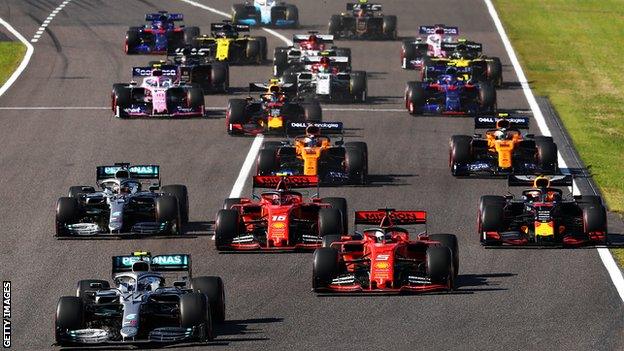
If Hamilton finishes outside of the top four in Mexico then the title would not be decided there and would move on to the next race - the United States Grand Prix on 3 November
The result at Suzuka means that Hamilton can no longer be caught this year by any driver other than Bottas, but even that is a long shot. The Finn is 64 points behind with only 104 available and needs two clear wins and a third place and Hamilton not to score in those three races.
Hamilton will surely win the title at one of the next two races in Mexico and the USA, more likely now Austin, Texas.
He expects a difficult weekend for Mercedes in Mexico City, saying Ferrari's straight-line speed advantage will make them very hard to beat, and where in any case it will be difficult, in normal circumstances, for Hamilton to make up the 14 points on his team-mate he needs to seal it there.
"For me," Hamilton said, "it has never been a case of wanting to rush things. Valtteri has driven well all year long. We still have a battle."
After a race in which Hamilton had argued with the team over the radio about strategy, which was carefully controlled to guarantee Bottas victory once he had the lead at the start, Wolff said: "We have to stay true to the values we have defined in the past and always played the most-fair game. You can see how difficult it is sometimes today.
"We are certainly keen on seeing them racing. Valtteri is very much an outsider with the points - two and a half wins out of four races - so we will give them equal opportunity and it is for them to race it out on track."
